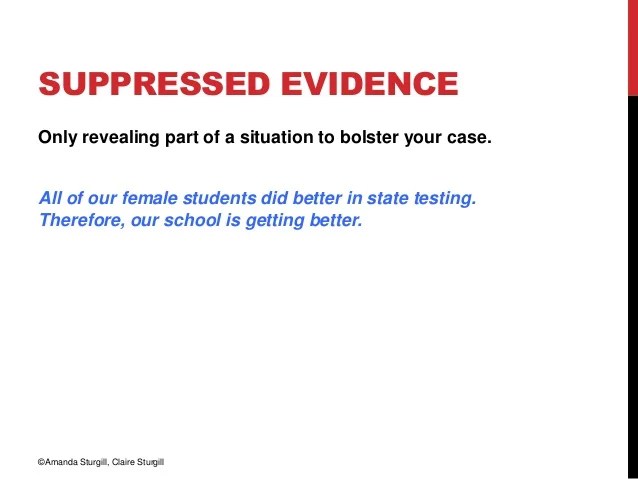Featured
- Get link
- X
- Other Apps
Suppressed Evidence Fallacy Examples
Suppressed Evidence Fallacy Examples. One commits the fallacy when one presents evidence or an argument for a position but leaves out (or suppresses) relevant evidence that would weaken or show false one's conclusion. See the exercise list below.

To key relevant and important evidence, is both manipulative and illogical; At first sight it seems that many theories that we describe as scientific involve such a fallacy. Eventually, our entire society will become engulfed in an orgy of lawlessness and brutality.
In The Same Way, Fallacy Can Be Defined As A Failure To Provide Adequate Proof For A Belief, The Failure Being Disguised To Make The Proof Look Adequate.
One reason incorrectly when the premises of an argument fail to support its conclusion and. Slippery slope questionable dilemma straw person hasty conclusion questionable cause questionable analogy suppressed evidence. Suppressed evidence fallacy in the discussion about inductive arguments, it is explained how a cogent inductive argument had to hav.
In An Induction, The Total Relevant Information Needs To Be Examined.
Fallacy is a mistake in an argument that arises from something other than merely false premises. Ad ignorantiam (appeal to ignorance) the truth of a claim is established only on the basis of lack of evidence against it. Buying the cray mac 11 computer for our company was the.
The Diagram Indicates That Some Facts May Be Ignored When Trying To Prove A Point.
Intentionally failing to use information suspected of being relevant and significant is committing the fallacy of suppressed evidence. This in turn will lead to an increase in juvenile delinquency and gang violence. Suppression of evidence is commonly found in the (mis)presentation of statistics.
This Is More Common That We’d Like To Admit.
Is a common fallacy is to suppress any evidence which may damage one's argument, i.e. Leaving out evidence that would lead to a different conclusion is called the fallacy of exclusion. Again due to time constraints, we will focus on only a sample of the fallacies in chapter 5.
This Fallacy Usually Occurs When The Information Counts Against One's Own Conclusion.
At first sight it seems that many theories that we describe as scientific involve such a fallacy. The fallacy is a kind of fallacy of selective attention. I’ve been reading and reflecting about fallacies since my days of high school debate my sophomore year.
Comments
Post a Comment